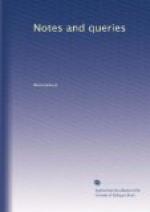“’There is a curse either on me or on this auld black bitch of a boat, that I have hauled up high and dry, and pitched and clouted sae mony years, that she might drown my poor Steenie at the end of them, an’ be d——d to her!’ And he flung his hammer against the boat, as if she had been the intentional cause of his misfortune”—Antiquary, vol. ii. chap. 13. Cadell, 1829.
V. “Giton praecipue,
ex dolore in rabiem efferatus, tollit
clamorem, me, utraque manu
impulsum, praecipitat super
lectum.”—Petron.
Arb. Sat. cap. 94.
The classical reader will at once recognise the force of the words “rabiem,” “efferatus,” “praecipitat,” in this passage. The expression “utraque manu” may not at first sight arrest his attention. It seems always used to express the most intense eagerness; see
“Ijecit utramque laciniae manum.”—Pet. Arb. Sat. 14.
“Utraque manu Deorum beneficia tractat.”—Ib. 140.
“Upon which Menedemus, incensed at his insolence, answered,—’Nothing is more necessary than the preservation of Lucullus;’ and thrust him back with both hands.”—Plutarch, Life of Lucullus.
“Women have a sort of natural tendency to cross their husbands: they lay hold with both hands [a deux mains] on all occasions to contradict and oppose them, and the first excuse serves for a plenary justification.”—Montaigne, Essays, book 2. chap. 8.
“Marmout, deceived by the seemingly careless winter attitude of the allies, left Ciudad Rodrigo unprotected within their reach and Wellington jumped with both feet upon the devoted fortress of Napier,” Pen. War, vol. iv. p. 374.
Any apology for the unwarrantable length of this discursive despatch, would, of course, only make matters worse.
C. FORBES.
Temple.
* * * * *
ETYMOLOGICAL NOTES.
1. Gnatch.—“The covetous man dares not gnatch” (Hammond’s Catechism). From this, and the examples in Halliwell’s Dictionary, the sense seems to be “to move.” Is it related to “gnake?”
2. Pert.—I lately met with an instance of the use of this word in the etymological sense peritus: “I beant peart at making button-holes,” said a needlewoman.
3. Rococo.—A far-fetched etymology suggests itself. A wealthy noble from the north might express his admiration for the luxuries of Paris by the Russian word [Cyrillic: roskosha], or Polish roskosz. A Frenchman, catching the sound, might apply it to anything extravagant enough to astonish a barbarian.
4. Cad.—The letters from Scotland ascribed to a Captain Burtt, employed in surveying the forfeited estates, give an account of the “cawdies,” or errand boys, of Edinburgh.
5. Fun, perhaps Irish, fonamhad, jeering, mockery (Lhuyd, Archaeologia Britannica).




